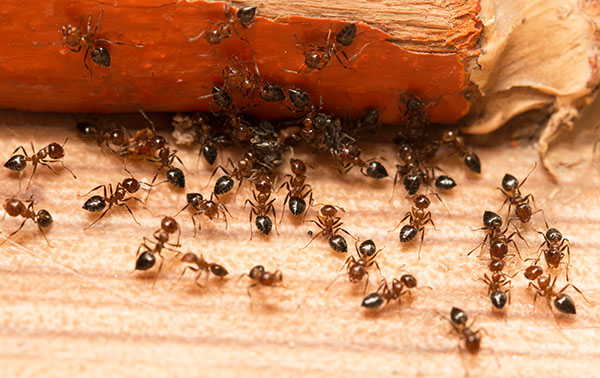 Parler
Parler Gab
Gab
Remove things that can attract ants
Ants often hide underneath house plants and make nests in the soil. It's best to discard any plants that appear to be infested. Lemon or orange rinds put inside the soil can discourage ants from making nests where house plants are located. Keeping food cabinets, countertops and floors clean and spotless also discourages ants from entering. Sweet foods – such as honey, sugar and maple syrup – should be kept tightly sealed in containers or plastic bags that lock well. Crumbs and spills should also be cleaned up immediately.Make a barrier that ants won’t be able to cross
Putting a barrier on windowsills and any spots that ants enter can stop them in their tracks. It is important to replenish these anti-ant barriers every few days, as ants can resume entry once these are broken. Ground cayenne or black pepper, cinnamon and coffee grounds can fulfill this purpose. Citrus fruits also work for repelling ants due to their natural acids. Grapefruits, lemons, limes and oranges mask ants' pheromone trails with a much more pleasant smell. Squeeze lemons into a spray bottle or rub a pureed blend of orange peel and water on door jams and window sills.Use essential oils to keep ants away
While humans like the smell of some essential oils, ants do not. Prepare a solution by adding 10 drops of essential oil to one cup of water, and put inside a spray bottle. Spritz the solution at both indoor and outdoor spaces to keep ants away. Cedar, clove, lavender, lemon, peppermint, rosemary, tea tree and thyme essential oils work best for this purpose. Eucalyptus oil can also be used as it is safe for pet dogs, but it should not be used near pet cats as it is toxic to felines.Look to the kitchen for natural ant deterrents
Kitchens often have natural deterrents for ants that households often overlook. Aromatic herbs such as rosemary and thyme can be put inside little cheesecloth bags and tucked inside kitchen cabinets. The same can be done with dried basil. (Related: Killing ants naturally with natural ant exterminators from pantry, garden and fridge.) White vinegar repels ants and disinfects hard surfaces, with a one-to-one mixture of vinegar and water being sprayed on areas where ants travel and congregate. People may perceive the smell of vinegar immediately after spraying, but this does not remain long. Ants, however, detect the vinegar after it dries. A few peeled cloves in garlic can be placed where ants are found, replacing the cloves every day or two when they dry out. All-purpose flour can also be scattered liberally across foundations, at door thresholds and on window sills where ants pass. The flour disrupts their pheromone trail followed by other ants to a source of food. Visit Homesteading.news for more stories like this. Watch this video discussing how to get rid of ants and flies cheaply and naturally. This video is from the Natural Cures channel on Brighteon.com.More related stories:
Mathematical model shows how ants behave when faced with an obstacle. Ants found to protect plants from disease by leaking "antibiotic" chemicals. The first farmers were ants… and they’ve been farming for millions of years. 12 Homemade pest control ideas for your kitchen and home garden. Green gardening secrets: How to eliminate bugs and pests without using poison. Sources include: ApartmentPrepper.com Healthline.com UrbanSurvivalSite.com FamilyHandyman.com Brighteon.comHealth tips: 7 Ways to control your blood pressure
By Olivia Cook // Share
Digital prepping: How to survive in a world dominated by AI
By Zoey Sky // Share
Why people love tea: A look at some herbal tea recipes for mild depression
By Olivia Cook // Share
Polyphenols in wild blueberries can help lower blood pressure and boost brain function
By Evangelyn Rodriguez // Share
Make sure your vitamin D levels are optimized, otherwise you could suffer a heart attack
By Ethan Huff // Share
Governments continue to obscure COVID-19 vaccine data amid rising concerns over excess deaths
By patricklewis // Share
Tech giant Microsoft backs EXTINCTION with its support of carbon capture programs
By ramontomeydw // Share
Germany to resume arms exports to Israel despite repeated ceasefire violations
By isabelle // Share










